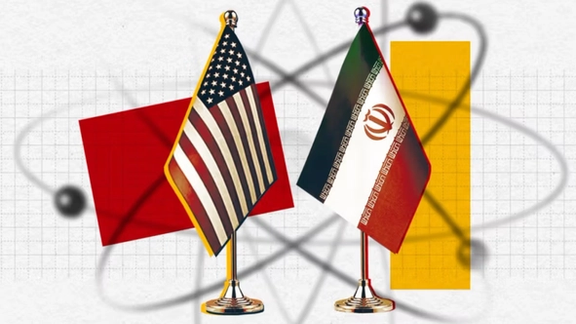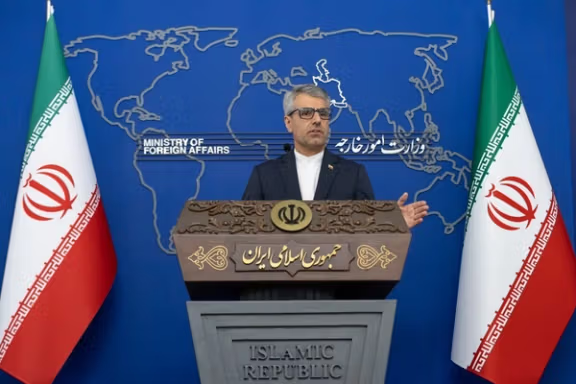Iran says Tehran-Washington message exchanges continue, not talks

Iran is exchanging messages with the United States but has not begun negotiations, Foreign Ministry Spokesman Esmail Baghaei said on Monday during his weekly briefing.

Iran is exchanging messages with the United States but has not begun negotiations, Foreign Ministry Spokesman Esmail Baghaei said on Monday during his weekly briefing.
“Messages are still being passed through various intermediaries, but this does not in any way mean the start of a negotiation process between Iran and the United States,” Baghaei said.
“No official message was conveyed to Iran during Deputy Foreign Minister Majid Takht-Ravanchi’s trip to Oman.”
Takht-Ravanchi visited Muscat last week for a meeting of the Iran-Oman Political Strategic Committee, where he and Omani Foreign Minister Badr Albusaidi discussed regional developments and plans to expand bilateral cooperation, according to Iranian media.
Recent commentary about a restart of direct or indirect talks had been imprecise, Baghaei said, adding that Tehran has received no formal communication from Washington via Muscat and that shuttle efforts are limited to narrowing gaps.
Diplomacy, he added, remains active with neighbors and partners, including Oman, while any talks must respect Iran’s rights under international law.

IAEA must avoid ‘baseless repetition’
Baghaei called on the International Atomic Energy Agency to avoid repeating what he described as politically driven assertions about Iran’s nuclear program.
“The Director General has in fact reiterated that Iran’s nuclear activities have always been peaceful and there are no indications of a military dimension,” he said.
“The Agency should remain within its technical mandate and refrain from echoing unfounded claims made by certain parties only seeking pretexts.”
Iran suspended cooperation with IAEA inspectors after a 12-day war in June against Israel and the United States, codified via a new law passed by parliament.
Tehran’s cooperation with the Agency, he added, continues under its international commitments, but political manipulation of technical reports “undermines trust and objectivity.”
In September, Iran and the agency agreed in Cairo to restart inspections. However, after Germany, France and the United Kingdom triggered the reimposition of UN sanctions, it remained unclear whether Iran would comply.
A report by the Center for Strategic and International Studies said satellite imagery shows continued construction at a major underground nuclear facility near Natanz.
No conditions for talks with the US
Baghaei dismissed suggestions of an imminent resumption of negotiations with Washington, saying the environment was not yet suitable. “Whenever we reach the stage of negotiations, decisions will be made regarding the composition of the negotiating team and other details,” he said.
“But at present, the conditions for a meaningful dialogue are not in place.”
Iran, he said, would only enter talks that respected its rights under the Nuclear Non-Proliferation Treaty.
“Our rights and interests must be respected… If the other side develops a realistic understanding and shows respect for Iran’s legitimate rights, then we can say conditions for meaningful dialogue will exist. At this stage, we are not there yet.”
Earlier this year, Washington and Tehran held five rounds of talks over Iran’s disputed nuclear program under a 60-day deadline imposed by President Donald Trump.
When the deadline expired without a deal on June 13, Israel launched a surprise military campaign, prompting US airstrikes nine days later on June 22 that hit major nuclear sites in Isfahan, Natanz, and Fordow
‘US threats to Latin America condemned’
Baghaei also condemned what he described as US military threats toward Venezuela and other Latin American countries.
“We categorically reject the United States’ military movements in the Caribbean and Latin America,” he said. “Such actions are detrimental to international peace and security and have no legal justification.”
He cited international conventions that prohibit the use of counter-narcotics operations as grounds for violating sovereignty.
“Even under the 1988 convention on combating drug trafficking, there is a clear provision stating that such efforts cannot justify breaching national sovereignty,” Baghaei said. “The threats against Venezuela and others are legally and politically unacceptable and contradict the principles of the UN Charter.”
Baghaei said such behavior risked setting “a dangerous precedent” for international relations. “We are concerned that these actions could normalize interventions by other states elsewhere in the world.”